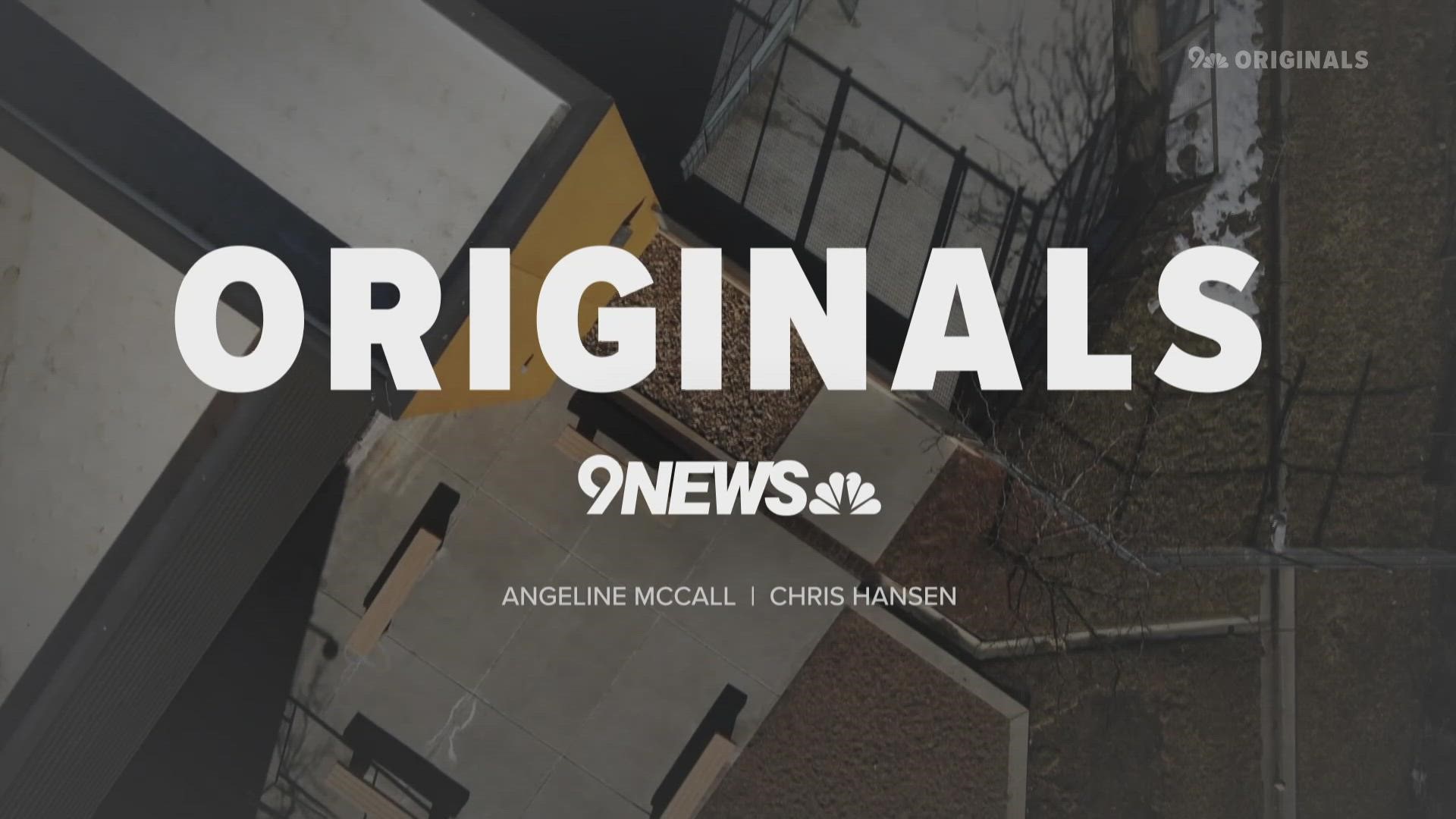DENVER, Colorado — >>> Desplácese hacia abajo para ver la versión en español
Maria decided to take her family from her home country of Venezuela to the United States. When she crossed the U.S.-Mexico border, she hoped initially to make it California. Instead, she arrived in Denver with her two kids, her husband and her dog Ramona, a miniature pinscher.
Up until this final stop in the journey, Ramona has been at her family's side: walking through the Darién Gap, traversing through Central America and evading dangers along the way.
"We fought alongside her on the journey," Maria said.
When their family eventually arrived in El Paso, Ramona spent her days the same way her family did – outside on the sidewalk of Sacred Heart Church. They would wait until sunset, when the church turned into an overnight shelter.
They eventually took a bus to Denver. Upon arrival, they registered at one of Denver's city-run shelters. They later learned that Ramona wouldn't be allowed to stay with her family.
"So we had no other option," Maria said.
Instead, Ramona was placed at the Denver Animal Shelter as a temporary solution until Maria and her family found more stable housing.

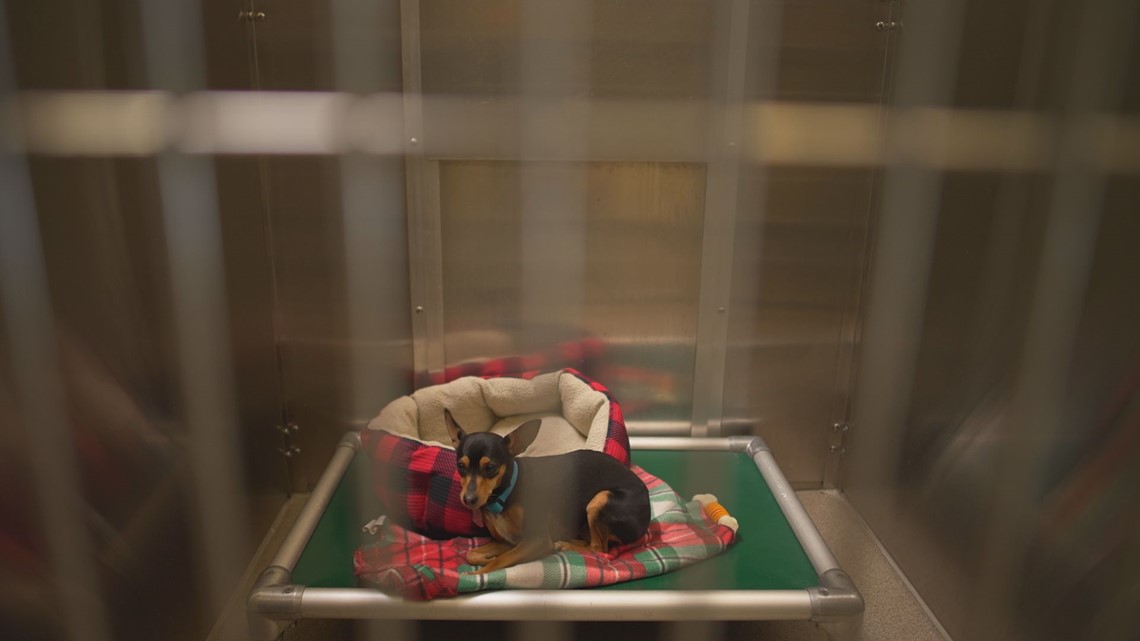
"The 25th of January, a Wednesday, the day we arrived in Denver," Maria said, remembering the last time she saw Ramona."She is part of my family, like a daughter. It hurts me just like it would hurt as much as my children."
Ramona is being held at the shelter as part of its Safe Haven Program. It offers two to four weeks of shelter for pets of families experiencing temporary homelessness due to fire, domestic violence or hospitalization. The program also provides a temporary solution to pet owners experiencing homelessness during severe weather.
The program recently expanded service to migrant families, who are in the midst of transition to another destination or more stable housing in the Denver metro area.
"For my family, it was really hard. It upset me a lot at first. I wanted to cry," Maria said. "In the first days, I couldn’t sleep. I didn’t sleep because she usually slept with me. I would wake up in the middle of the night and tears would come down, being alone. I said, 'Where is Ramona? Is she feeling badly? Is she sad?' I felt badly [about it]."

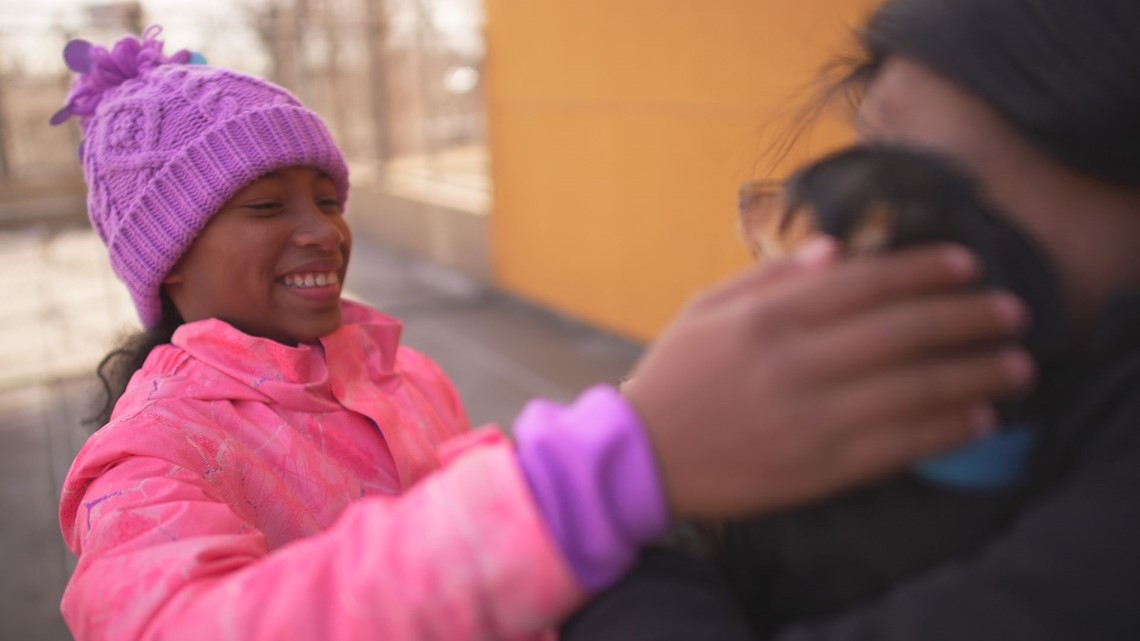
Recently, Maria and her kids had the opportunity to see Ramona at the shelter. The visit felt happy and sad at the same time, seeing Ramona again and knowing they wouldn't yet be able to be permanently reunited.
"It’s really hard," Maria said. "It’s like being separated from a child, as if she were one. I want her back."

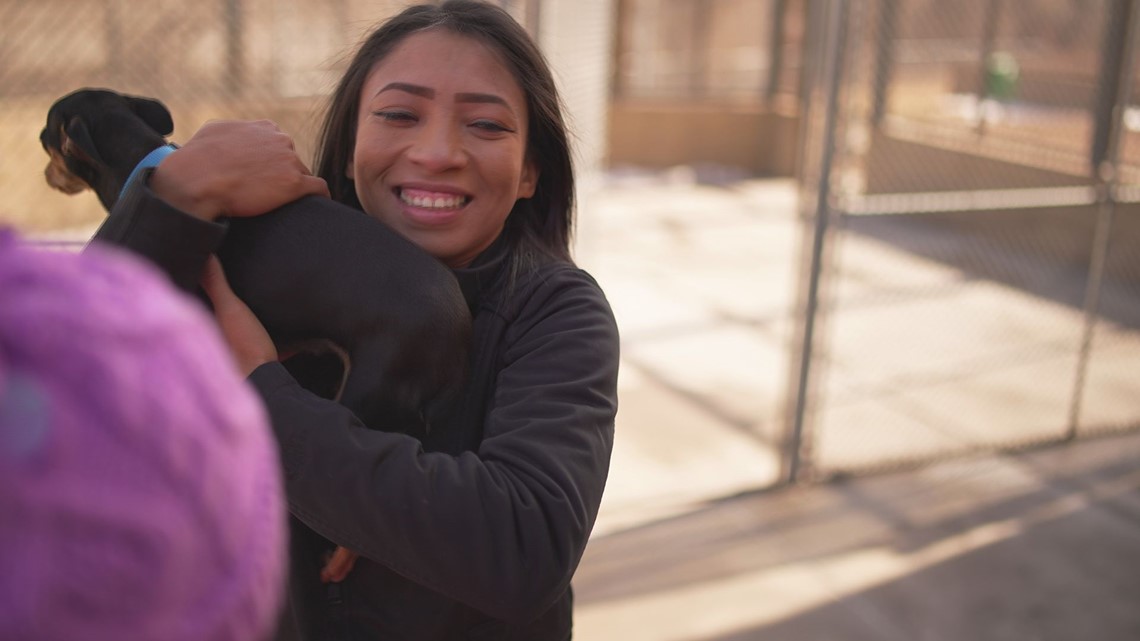
While Ramona is separated from her family, the situation signifies another struggle in what has turned into a long journey with unexpected challenges. Ramona's absence is a reminder that they haven't found what they are looking for, but they hope that one day, they will.
"We will be with her soon," Maria said to her son while consoling him after their visit with Ramona was over.
As of right now, the shelter is working on a plan with a couple who has expressed interest in fostering Ramona until Maria and her family are more settled.
Ramona is the only dog in the shelter's care that belongs to the migrant family. They are caring for other dogs as part of the Safe Haven Program, but it can be limited when the shelter is full of strays or owners surrender animals.
If people want to help care for more animals like Ramona, the best way to do so is to sign up to be a foster family through the Denver Animal Shelter.

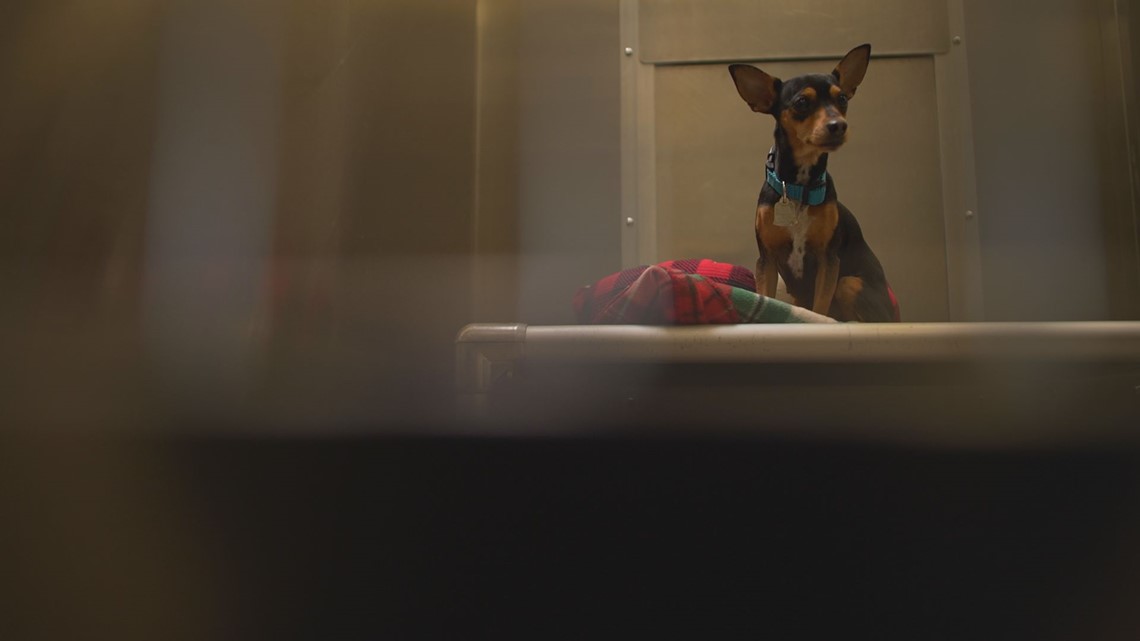
9NEWS has also compiled a list of resources for migrants that include assistance with food, housing, asylum processing, physical and mental health support and more.
Migrant resources:
Connect with a variety of community resources, including food, fitness, and employment resources. Servicios is located at 3131 W. 14th Ave. Their phone number is 303-458-5851 and their email address is info@serviciosdelaraza.org.
El Centro Humanitario
Centro Humanitario can help connect people with job opportunities, education and more. Their phone number is 303-292-4115 and their email is info@centrohumanitario.org.
Vive Wellness can help connect people with physical and mental health support. They are located at 1620 E. 36th Ave., their phone number is 720-440-1235. Their email address is info@vivewellness.org.
Colorado Housing helps find available affordable rental opportunities throughout the state. More information can be visiting their website at ColoradoHousingSearch.com or people can call them at 877.428.8844.
Colorado AFL-CIO
Colorado AFL-CIO helps search for employment opportunities. The president wants to create an apprenticeship program for immigrants.
Coaflcio.org. They are located at 925 South Niagara St., Suite 600 and their phone number is 303-433-2100.
Rocky Mountain Immigrant Advocacy Network (RMIAN)
Rocky Mountain Immigrant Advocacy Network (RMIAN) can help people with asylum resources. Their phone number is 303-433-2812.
Food Bank of the Rockies helps people find a food distribution center near them. They are located at 10700 E. 45th Ave. Their phone number is 303-371-9250.
Mile High United Way’s 211 Help Center is a multilingual and confidential service that connects individuals and families to critical resources including food, shelter, rental assistance, childcare, and more. People can call 2-1-1 text their zip code to 898-211.
Justice and Mercy Legal Aid Clinic (JAMLAC) is offering a legal orientation workshop on Thursday, February 16, March 2 and 16.
People will be able to learn about their immigration status, their rights and obligations as a migrant, pathways to immigration relief and how to protect themselves and their family.
The workshops will be held at the Montbello Public Library, located at 12955 Albrook Dr. The workshops will be followed by questions and answers provided by volunteer attorneys.
Familia migrante en Denver enfrenta desafíos inesperados

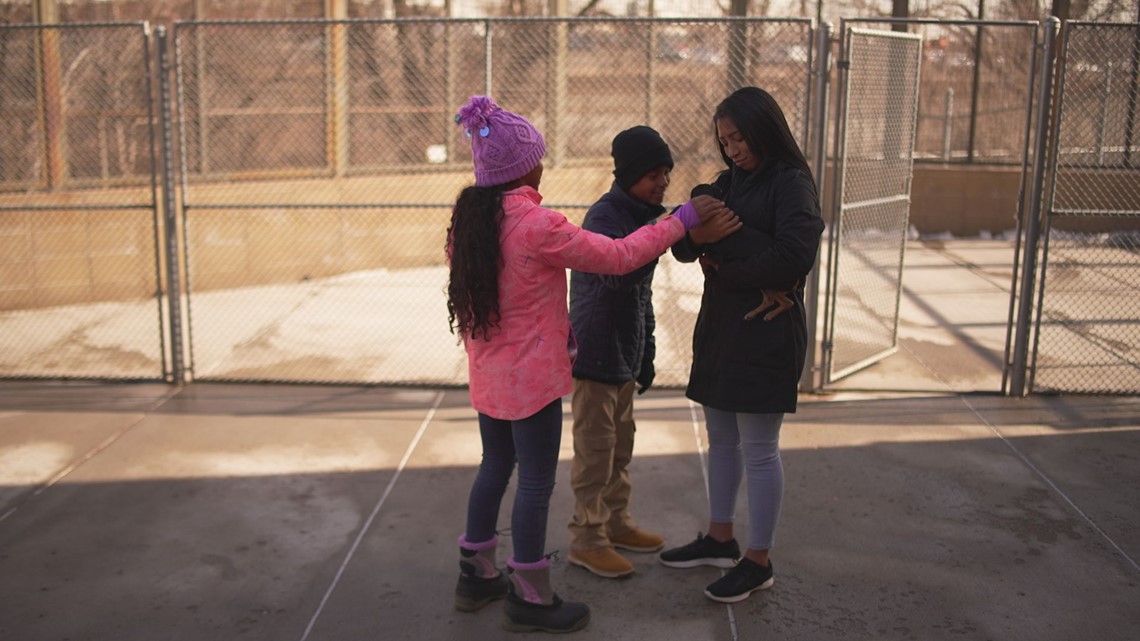
María decidió llevar a su familia de su país de origen, Venezuela, a los Estados Unidos. Cuando cruzó la frontera entre Estados Unidos y México, inicialmente esperaba llegar a California. En cambio, llegó a Denver con sus dos hijos, su esposo y su perrita Ramona, una pinscher miniatura.
Hasta esta última parada del viaje, Ramona ha estado al lado de su familia: caminando por el Tapón del Darién, atravesando Centroamérica y sorteando los peligros del camino.
"Luchamos junto a ella en el viaje", dijo María.
Cuando su familia finalmente cruzo al El Paso, Ramona pasó sus días de la misma manera que su familia: afuera en la acera de la Iglesia del Sagrado Corazón. Luego esperarían hasta la puesta del sol, cuando la iglesia se convertía en un refugio nocturno.
Eventualmente pudieron tomar un autobús a Denver. Al llegar, se registraron en uno de los refugios administrados por la ciudad de Denver. Más tarde se enterarían de que a Ramona no se le permitiría quedarse con su familia.
"Así que no teníamos otra opción", dijo María.


En cambio, la colocarían en el Refugio de Animales de Denver como una solución temporal hasta que María y su familia encontraran una vivienda más estable.
“La última vez fue el 25 de enero, un miércoles, el día que llegamos a Denver”, dijo María al recordar la última vez que vio a Ramona. “Ella es parte de mi familia, como una hija. Me duele igual, tanto como mis hijos".
Ramona se encuentra actualmente retenida en el refugio como parte de su programa Safe Haven. Ofrece de dos a cuatro semanas de refugio para mascotas de familias que se encuentran sin hogar temporalmente debido a incendios, violencia doméstica u hospitalización.
El programa también brinda una solución temporal a los dueños de mascotas que se encuentran sin hogar durante condiciones climáticas adversas. El programa amplió recientemente su servicio a las familias migrantes, que se encuentran en medio de la transición a otro destino oa una vivienda más estable en el área metropolitana de Denver.
"Para mi familia, fue muy difícil. Me molestó mucho al principio. Quería llorar", dijo María. “Los primeros días no podía dormir. No dormía porque ella solía dormir conmigo. Me despertaba en medio de la noche y me salían las lágrimas, estaba solo. ¿Se sentirá mal? ¿Estará triste? Me sentí mal (al respecto)".


Recientemente, María y sus hijos tuvieron la oportunidad de ver a Ramona en el albergue. La visita se sintió feliz y triste al mismo tiempo, al volver a ver a Ramona sabiendo que no podrían reunirse permanentemente hasta una fecha posterior.
“Es muy duro. Es como estar separada de un niño, como si fuera uno. La quiero de vuelta”, dijo María.
Mientras Ramona se encuentra separada de su familia, la situación significa otra lucha en lo que se ha convertido en un largo viaje con desafíos inesperados. La ausencia de Ramona es un recordatorio de que aún no han encontrado lo que buscan, pero que algún día tienen la esperanza de encontrarlo.
“Pronto estaremos con ella”, le dijo María a su hijo mientras lo consolaba después de que terminó su visita a Ramona.
En este momento, el refugio está trabajando en un plan con una pareja que ha expresado interés en acoger a Ramona hasta que María y su familia estén más asentados.
Ramona actualmente es la única perra a cargo del refugio que pertenece a una familia migrante. Actualmente están cuidando a otros perros como parte del programa Safe Haven, pero puede ser limitado cuando el refugio está lleno de perros callejeros o los dueños entregan animales. Si las personas quieren ayudar a cuidar a más animales como Ramona, la mejor manera de hacerlo es inscribirse para ser una familia de acogida a través del Refugio de Animales de Denver.


La estación también compiló una lista de recursos para migrantes que incluyen asistencia con alimentos, vivienda, procesamiento de asilo, apoyo de salud física y mental y más.
Recursos para migrantes:
Servicios de la Raza ayuda a personas a conectar con una variedad de recursos comunitarios, que incluyen recursos de alimentos, acondicionamiento físico y empleo. Servicios está ubicado en 3131 W. 14th Ave. Su número de teléfono es 303-458-5851 y su dirección de correo electrónico es info@serviciosdelaraza.org.
El Centro Humanitario
El Centro Humanitario puede ayudar a conectar a las personas con oportunidades laborales, educación y más. Su número de teléfono es 303-292-4115 y su correo electrónico es info@centrohumanitario.org.
Vive Wellness puede ayudar a conectar a las personas con apoyo de salud física y mental. Están ubicados en 1620 E. 36th Ave., su número de teléfono es 720-440-1235. Su dirección de correo electrónico es info@vivewellness.org.
Colorado Housing ayuda a encontrar oportunidades de alquiler asequibles disponibles en todo el estado. Se puede obtener más información visitando su sitio web en ColoradoHousingSearch.com o las personas pueden llamarlos al 877.428.8844.
Colorado AFL-CIO ayuda a buscar oportunidades de empleo. El director quiere crear un programa de aprendizaje para inmigrantes. www.coaflcio.org. Están ubicados en 925 South Niagara St., Suite 600 y su número de teléfono es 303-433-2100.
Rocky Mountain Immigrant Advocacy Network (RMIAN) puede ayudar a las personas con recursos de asilo. Su número de teléfono es 303-433-2812.
Food Bank of the Rockies ayuda a las personas a encontrar un centro de distribución de alimentos cerca de ellos. Están ubicados en 10700 E. 45th Ave. Su número de teléfono es 303-371-9250.
El Centro de ayuda 211 de Mile High United Way es un servicio multilingüe y confidencial que conecta a las personas y las familias con recursos críticos que incluyen alimentos, vivienda, asistencia para el alquiler, cuidado de niños y más. Las personas pueden llamar al 2-1-1 y enviar un mensaje de texto con su código postal al 898-211.
La Clínica de Ayuda Legal Justicia y Misericordia (JAMLAC) está ofreciendo un taller de orientación legal el jueves 16 de febrero, 2 y 16 de marzo.
Las personas podrán aprender sobre su estatus migratorio, sus derechos y obligaciones como migrante, los caminos hacia el alivio migratorio y cómo protegerse a sí mismos y a su familia.
Los talleres se llevarán a cabo en la Biblioteca Pública de Montbello, ubicada en 12955 Albrook Dr. Los talleres serán seguidos por preguntas y respuestas proporcionadas por abogados voluntarios.
SUGGESTED VIDEOS: Feature stories

